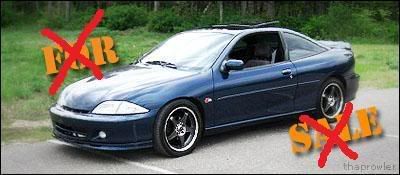I suppose this belongs in the boost forum... Lowering your compression ratio is safer for running boost, correct? It makes less power than a higher compression engine at a given PSI, but it's less chance to blow up, or am I completely wrong on this?
Just trying to straighten a few things out, thanks.

yup sums it up in a basic sense

but changing your compression does not make you lose a lot of hp, maybe a few like 5-10 but not like 20-30
 LE61T PTE6262 Powered
LE61T PTE6262 Powered 
comp ratio does make a difference..you can make the same amount of power on 6-8psi as u could with say 10-12 on a low comp motor. (say from 11:1 to 8:1)
the reason 90% of the people go with lower compression is they are street cars and run on pump fuel. high compression+boost(im talking more then like 6psi) needs higher then 92 octane

12.5@116 2.0 60ft
OR..you have to pull timing to the point where you're losing more power than gaining. I remember they made turbo kits for the motor in the GTS Celica. Stock compression was 11.8:1..if memory servers it was a small turbo running 7 PSI....it can be done.
I'd say another reason a lot of people drop compression is because there's more margin for error.
Alright guys, thanks for the responses. Trying to learn all I can, and the JBO hasn't failed me yet as far as providing good info goes.
Also, why do you need a higher octane fuel if you're running high compression and boost? As well, ignition before the spark plugs cause it is referred to as "knock" right?

Higher octane allows the fuel to burn completely and evenly, reducing the chances of detonation, and major problems.
Ron Carvalho wrote:Alright guys, thanks for the responses. Trying to learn all I can, and the JBO hasn't failed me yet as far as providing good info goes.
Also, why do you need a higher octane fuel if you're running high compression and boost? As well, ignition before the spark plugs cause it is referred to as "knock" right?
Any one of these things or combination of them can cause knock.
Too lean
Timing to advanced
Too low of octane fuel
Too high of heat causing pre igniton

FORGET GIRLS GONE WILD WE HAVE GOVERNMENT SPENDING GONE WILD!
Cool, thanks guys. Glad to suck the info outta ya ;P

"octane" is simply the fuel's resistance to "knock" (aka pre-ignition, detonation,etc.), so a higher-octane fuel doesn't help the engine unless it is knocking. Octane is increased by making the fuel more stable, i.e. more resistant to combustion. because of this, the fuel burns slower. therefore, in theory, it may even reduce your power production if you use a higher-octane fuel than is needed. (I emphasise "in theory" because in practice, the difference between 87 and 93 octane probably won't be noticable, even if it's measureable). so, "octane booster" chemicals are bullsh*t, unless they increase the fuel's energy, rather than its octane.
it's also significant, though, that many fuel companies use different detergents in higher-octane fuels that may be beneficial, but IMHO, the cost outweighs the benefits in that area, especially with "fuel system flush" chemicals you can get off the shelf, which have similar, if not the same effects.
LD9 F23 FTW!!
Ron Carvalho wrote:Alright guys, thanks for the responses. Trying to learn all I can, and the JBO hasn't failed me yet as far as providing good info goes.
Also, why do you need a higher octane fuel if you're running high compression and boost? As well, ignition before the spark plugs cause it is referred to as "knock" right?
,
Higher octane fuel requires more energy (in the form of heat) to crack the hydro-carbon chain, so this effectively slows the rate of pressure rise and combustion speed. Since higher compression and boost levels push an engine closer to detonation, a more knock-resistant fuel is needed. Ignition before spark-ignition is called detonation which produces "knock".
I would highly recommend a book on performance tuning or performance turbo/supercharging. You'll find the most accurate answers to your questions and expand your knowledge. The forums are also great, but as with any source you need to be careful and check more than one source.
heavyclutch wrote:I would highly recommend a book on performance tuning or performance turbo/supercharging. You'll find the most accurate answers to your questions and expand your knowledge.
Maximum Boost by Corky Bell. Good stuff.
_________________________________________
450WHP Turbo Ecotec swap in the works...

for the record C16 cures all knock troubles...

-Trailblazer SS - not so custom 6.0L - custom intake - custom tune
- (1) 2.4L on an engine stand (1) blown trans (2) good quad trans (1) eco trans = party
toyotaz87 wrote:"octane" is simply the fuel's resistance to "knock" (aka pre-ignition, detonation,etc.), so a higher-octane fuel doesn't help the engine unless it is knocking. Octane is increased by making the fuel more stable, i.e. more resistant to combustion. because of this, the fuel burns slower. therefore, in theory, it may even reduce your power production if you use a higher-octane fuel than is needed. (I emphasise "in theory" because in practice, the difference between 87 and 93 octane probably won't be noticable, even if it's measureable). so, "octane booster" chemicals are bullsh*t, unless they increase the fuel's energy, rather than its octane.
it's also significant, though, that many fuel companies use different detergents in higher-octane fuels that may be beneficial, but IMHO, the cost outweighs the benefits in that area, especially with "fuel system flush" chemicals you can get off the shelf, which have similar, if not the same effects.
I just want to add that John Higgins did some experimenting and I do not want to misquote him but I think the just of his findings were that there should be a small increase in performance due to less knock which means less timing retard when going from 87-93. I suggest you talk to him about it though.
93 octane is not too high for a stock car but anything beyond that probably is. And you are right when you say you probably will not feel the difference going from 87-93. So I understand why you do not feel premium is worth it.

FORGET GIRLS GONE WILD WE HAVE GOVERNMENT SPENDING GONE WILD!
Remember, lowering compressing increases lag too.
O noes!
Wade Jarvis wrote:toyotaz87 wrote:"octane" is simply the fuel's resistance to "knock" (aka pre-ignition, detonation,etc.), so a higher-octane fuel doesn't help the engine unless it is knocking. Octane is increased by making the fuel more stable, i.e. more resistant to combustion. because of this, the fuel burns slower. therefore, in theory, it may even reduce your power production if you use a higher-octane fuel than is needed. (I emphasise "in theory" because in practice, the difference between 87 and 93 octane probably won't be noticable, even if it's measureable). so, "octane booster" chemicals are bullsh*t, unless they increase the fuel's energy, rather than its octane.
it's also significant, though, that many fuel companies use different detergents in higher-octane fuels that may be beneficial, but IMHO, the cost outweighs the benefits in that area, especially with "fuel system flush" chemicals you can get off the shelf, which have similar, if not the same effects.
I just want to add that John Higgins did some experimenting and I do not want to misquote him but I think the just of his findings were that there should be a small increase in performance due to less knock which means less timing retard when going from 87-93. I suggest you talk to him about it though.
93 octane is not too high for a stock car but anything beyond that probably is. And you are right when you say you probably will not feel the difference going from 87-93. So I understand why you do not feel premium is worth it.
87 octane has a higher internal energy than 93 and will burn faster than 93. If you are getting "0" knock with 87, there is
absolutely no way you could create more power with 93 octane with the same fuel and spark tables.
-
"Youth in Asia"...I don't see anything wrong with that.









